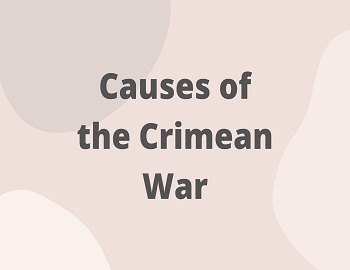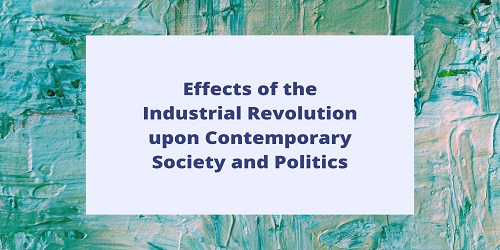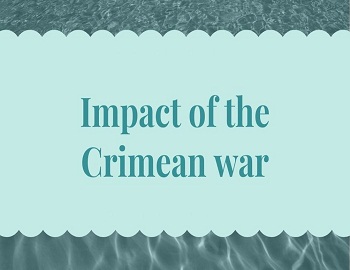The Crimean War:
The Eastern Question popped again and again in the history of Europe because the great powers in Europe suspected each other. According to Czar Nicholas, Turkey was the sick man of Europe and the Turkish empire was degenerating so it would be better if its division was well considered before its extinction. He himself wanted to occupy Constantinople and that Egypt and Crete should go to England. But Lord Palmerston was not ready to accept this suggestion of Czar Nicholas. He wanted to treat this ‘sickman’ and through this treatment to save his Indian Empire. It may be appropriate to mention here that this political proposal of Nicholas was finally accepted in 1915, but in 1839, Palmerston was not ready to consider the Turkish Empire dead or a stemless tree so he called the ideology of Nicholas as unadulterated nonsense.
Causes of the Crimean War:
There was peace in eastern Europe between 1841 and 1852 and Sultan Abdul Majid (1839-61) had all opportunity of improving the condition of his empire. He introduced several reforms in the field of military, education and local administration, but when he attempted to do away with religious discrimination, the Ulemas and moulavies began to criticise him; besides, the problem of the Greek Church and Catholics weakened his position. The causes responsible for the Crimean War are as follows-
(1) Incompetence of the Sultan of Turkey- The Sultan of Turkey was an incompetent person and Turkey was already a weak nation. This weakness led to Crimean War. The administration of the Sultan was not strong and his religious policy was conservative and oppressive towards his subjects who professed different religions. People were sad in his regime. The Sultan’s power had long been declining and the question which was being more or less openly discussed was as to who should divide his territories which included, besides the Balkans, Egypt, Syria and Palestine.
(2) Russian Proposal for the Division of Turkey- Russia wanted the dissolution of the Turkish Empire. She wanted that the European powers should divide the states of the Turkish Empire among themselves. Several times, she had proposed for it. In 1844, Czar Nicholas I had expressed his opinion before England in favour of the dissolution of Turkey. In 1853, he again repeated his proposal before the British Ambassador and said: “We have on our hands a sick man, a very sick man; it will be, I tell you frankly, a great misfortune if, one of these days, he should slip away from us before all necessary arrangements were made”. England turned down these proposals because they were against her basic policy that the integrity of Turkey be maintained. This aggravated antagonism between Nicholas and England.
(3) Uncertain British Policy- Britain’s Turkish policy was somewhat vague. On the one hand, she wanted to stop the dissolution of the Turkish Empire and on the other, to put a check on the spread of Russian influence in the south-east. In reality, England did not want the dissolution of the Turkish Empire, so she always helped Turkey whenever necessary. She did not want the Russian influence to spread in Turkey because it might threaten Britain’s Indian Empire. In this connection, Russel writes, ‘If we do not stop Russia on the Danube, we shall have to stop her on the Indus’. So attempts were made to resolve this problem with the help of Lord Stratford de Redcliffe, the British ambassador in Turkey. Redcliffe advised the Sultan of Turkey to ask the Russian ambassador to submit his demands separately in two parts- (1) demand for holy places and the right of patronage on them. (2) right to protect Greek monks. Menshikov presented his demands clearly divided in two parts, then on the advice of Redcliffe, the Sultan accepted the first part and turned down the second. When the Russian ambassador learnt of this decision of the Sultan, he felt so irritated that he immediately left Constantinople. The Sultan did not feel perturbed by this and presumed that the problem had been solved.
(4) Immediate Cause- Greek and Latin monks had been living for centuries in the holy places of Jerusalem in Palestine under the Turkish Empire. It was a holy place for Christians. In 1535, the Turkish Emperor Suleiman had handed over the task of protecting the holy pilgrimages centres to the Latin monks. In another treaty of 1740, it was agreed upon that France would be responsible for the safety of Latin monks and Russia for that of the Greek monks. After the French Revolution of 1789, France ceased to take interest in this matter. Taking advantage of the disorder in France, the priests of the Greek Church began to transgress the special rights of the Roman Church.
In 1852, Napoleon III became the emperor of France. In 1849, he had abolished the republican government of Rome which was established by Mazzini, an eminent leader of Italy. This act of Napoleon III made the Roman Catholic population of France his staunch followers. After becoming the Emperor of France, he demanded that France should again be given the right to protection of the Roman Christians living in the Turkish Empire. There were two main objects of Napoleon III behind this demand-
- He wanted to adopt such foreign policy which might help him in increasing the prestige and glory of France in the international arena.
- He wanted to appease the Roman Catholics of France and secure their full cooperation.
In order to fulfil his ambitions, Napoleon III demanded the right of protection to the Roman Christians. The Sultan of Turkey accepted the demands of Napoleon III but Russia bitterly opposed the proposal of France. She favoured the Greek Christians and made it clear that she would not tolerate any interference with the rights of the Greek Christians. Russia gave an ultimatum to Turkey in 1853, but Turkey, on the advice of England, refused to accept the demands of Russia. England advised Turkey that the demands of Russia, if accepted, “might possibly grow into a constant right of intervention by Russia in the international affairs of Turkey, ultimately making that country a kind of vassal of the former.”









Comments (No)